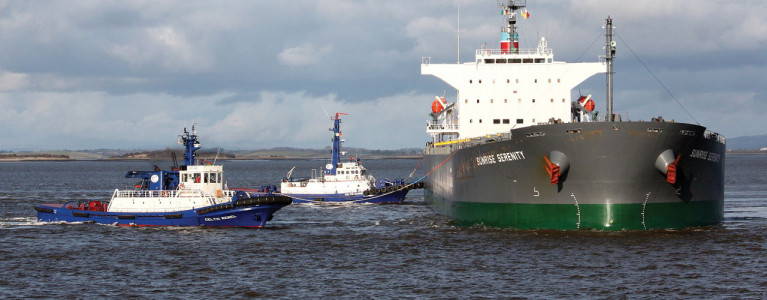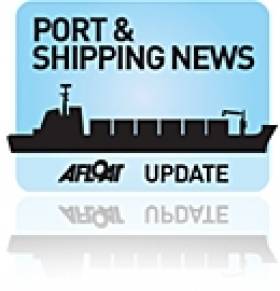Displaying items by tag: Shannon Foynes
The Aberdeen of the Irish Atlantic rim – that’s the potential future for Shannon Foynes, the State’s second port after Dublin.
It faces an exciting future, with ESB’s Moneypoint site in County Clare to be transformed into a green energy hub, and plans by the ESB and Norwegian partner Equinor for a floating offshore wind farm of 1,400MW off the Clare and Kerry coast.
A report published in May 2020 by renewable energy consultants Carbon Trust said that not one of 21 ports and harbours in Ireland was capable of anchoring a construction project for offshore wind.
 The ESB-Equinor joint-venture is Ireland’s largest land or sea-based wind-farm with an associated hydrogen plant at Moneypoint Photo: SFPC
The ESB-Equinor joint-venture is Ireland’s largest land or sea-based wind-farm with an associated hydrogen plant at Moneypoint Photo: SFPC
However, Shannon Foynes discounts that, with both space and deep water; and it believes that offshore renewable energy’s development will offer opportunities for a number of Irish ports and harbours along the west coast, including Galway and Killybegs, Co Donegal.
Last year, Minister for Transport Eamon Ryan also committed to reinstating the 40 km Limerick to Foynes rail link.
Capt Hugh Conlon is Shannon Foynes harbourmaster, and as part of our occasional series on ports, he spoke to Wavelengths about his port’s future, about the past year with Covid 19, about the development of recreational activity – and the health of the estuary’s dolphins.
Listen to Wavelengths here
Shannon Foynes Port Achieved Record Profit Last Year
The government-owned Shannon Foynes Port achieved a record profit before tax of €4.9 million last year, its annual report shows.
The port's profit, which was up from €4.4 million in 2018, was achieved despite an overall reduction in tonnages on the year before.
The facility on the Shannon estuary, which is the country’s largest bulk port for non-container freight, pointed out that 2018 was a record year for tonnage throughput due to elevated agricultural inputs arising from the drought-imposed fodder crisis.
Turnover decreased by 4.6 per cent to just under €14 million, down from €14.7 million in 2018.
Year-on-year overall tonnage throughput decreased by 10 per cent to 9.6 million tonnes, with reduced imports of coal for electricity generation accounting for most of this reduction.
Government Begins Review of Irish Ports
Minister for Transport Noel Dempsey T.D. today announced the launch of a national ports policy review with the publication of a consultation document.
There are ten State commercial port companies established and operating pursuant to the terms of the Harbours Acts 1996 - 2009; Cork, Drogheda, Dublin, Dundalk, Dún Laoghaire, Galway, New Ross, Shannon Foynes, Waterford and Wicklow.
It is estimated that approximately 99% by volume of all goods traded into and out of Ireland are handled at our ports. Dublin Port is the State's biggest port handling approximately 44% of all tonnage in 2009. Cork and Shannon Foynes were the second and third biggest ports respectively in 2009.
Today's consultation document provides stakeholders with an opportunity to help shape future ports policy.
Speaking today Minister Dempsey said; "In 2005 our national Ports Policy Statement outlined national ports policy in a single document for the first time. Since then the commercial, technological, and regulatory environment in which Irish ports operate has changed dramatically, both domestically and globally. It is now time to carry out a review of this policy framework to ensure that our ports are properly positioned for the future.
Since 2005 our ports have experienced both record highs and more recently sharp declines in tonnage throughput. The ports face considerable challenges and it is important that national policy helps address these. The indications are that the country's return to economic growth will be export led. In this regard, it is vital that the ports are in a position to facilitate this and to make their contribution to improving national competitiveness.
I would encourage all interested parties to engage fully in this important consultation process."
The consultation document provides an overview of developments in the sector since 2005 and poses a number of questions on the continued validity and future direction of national ports policy.
Important issues addressed in the document include planning and funding future port developments, the role ports have to play in delivering the "Smarter Travel" agenda, competition within the sector and the corporate governance regime for port companies.
The public consultation period is scheduled to continue until Friday 29th October 2010.
The full Consultation Document is available for download below
To make a submission click HERE
Read Tom MacSweeney's Island Nation blog on the importance of ports HERE































































